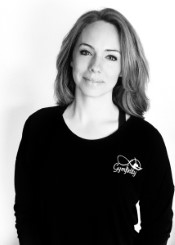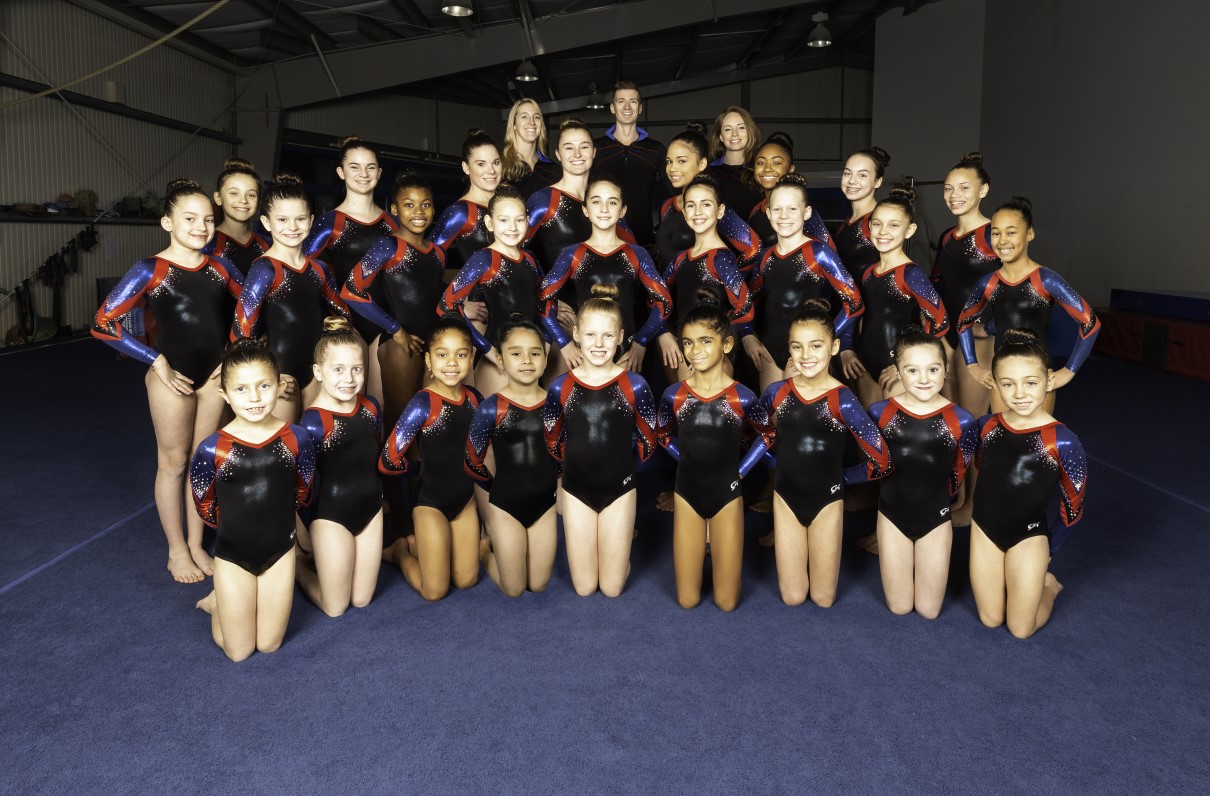 By Hannah Becker
By Hannah Becker
Army veteran and military spouse Ande Silberman is the owner of Gymfinity International GmbH, a gymnastics academy in Kaiserslautern, Germany. Ande founded Gymfinity International after her family PCSed to Europe, with the goal of bringing high-level gymnastics instruction and training to the community. Starting a business overseas presented a number of entrepreneurial challenges that Ande, pictured, tackled head-on to make her company successful. She's married to an Army JAG and has five children. They are serving their final tour before retiring in the Kaiserslautern military community.
What's your military story?
The military has been part of my entire life, as my father and grandfathers were all officers in both the Air Force and Army. I joined the Army as well, serving as an Airborne Public Affairs Journalist with the 4th Brigade, 25th Infantry Division, out of Alaska, and deployed to Afghanistan for Operation Enduring Freedom 2009-10. I was based at FOB Salerno but spent the year traveling to various FOBs/COPs to document different missions, showing the full spectrum of operations ranging from government councils to community projects to full combat operations. I essentially got to follow around heroes and try to show the world how amazing they were, and truly felt it was the best job in the Army.
Tell us about your business!
I opened Gymfinity International in 2017, three months after our PCS to Germany. It is an American-style gymnastics gym, but a German business (GmbH). We are a competitive program competing in four different organizations internationally and have competitions in Germany, the UK, America, Spain, etcetera. Competing in Europe, the UK, and America allows us to have a full range of athletes - our youngest team athletes are five and the oldest we have this year is 31.
Aside from our competitive teams, we offer programs for developmental gymnastics, preschool, tumbling, circus arts, boys' fitness, open gym, and adults. We also have special programmings, such as a parent's-day-out style preschool with academic movement-based curriculum, summer camps, continuing education clinics, and more.
We have 15-20 staff members depending on the PCS wave, and currently, 350 athletes enrolled in regular classes, with full waitlists. We are already in the process of building a new facility to expand as the need in our community for this was even greater than we ever imagined!
Overall, we love gymnastics but are really committed to developing life skills and great character qualities through the sport, in both our athletes and our staff. We have a great team of coaches who are all very passionate about raising a healthy future generation of athletes.
How has the military community and experience influenced your entrepreneurial journey?
Being part of the military, both as a soldier and as a family member has allowed for a perspective of some of the unique challenges facing military communities. I know how hard it is to live overseas, or have your spouse gone while you're managing the family and a job, or try to schedule a thousand appointments to prepare for another PCS… or on the other side, to try to make sure your family is happy and healthy during a deployment, knowing there is only so much you can do to help from half a world away. Being a soldier's spouse is way harder than being a soldier ever was, so I really have compassion for all of the spouses supporting their service members. When building our programs, I tried to keep a level of flexibility available as much as possible, to make logistics or payments or anything else just a little bit easier for our families. Being flexible as a business though causes quite a bit of extra work and problem-solving for us as a staff, and we've had to try out some different options to make it work. However, being able to provide make-up classes, vacation prorates, drop-off programs, and having all of our programs on a no-contract, month-to-month basis, has been well worth the effort.
What's been the hardest part of starting your own business?
Balancing my family life and my work life has been, hands down, the hardest part. They are so supportive, but no amount of support can make up for an 80-hour work week (which doesn't happen often, but more than it should).
On the business end though, I've had three main challenges:
1. Learning the laws and systems of a different country and trying to wiggle through the red tape has been really difficult. Shifting from growing up in a capitalist culture to operating a business in a socialist culture deeply rooted in tradition is unique. There are a ton of pros and cons to both systems, but certainly a lot of red tape with a huge learning curve.
2. We grew so fast that I didn't have time to get certain systems and processes into place for the volume of families we had. In my business plan projections, I had been very conservative to ensure that we would be able to remain viable in the early years. Our first year reached the numbers I had projected all the way at the end of the business plan. This is a great problem to have when looking at numbers, but in reality, it feels a lot like drowning. I had staff that needed to be trained far longer than we were able to train them, and customers asking questions I didn't have an answer for. I thought I would need a receptionist and two or three coaches at this point. I have a staff of 15-20 depending on the PCS wave, and managing the staff is a full-time job all by itself, let alone hundreds of athletes and their parents. It's been a wonderful, overwhelming experience that I am so grateful for.
3. Staffing was another challenge. Even in the U.S., finding educated coaches is not easy, but here we're usually at the mercy of whoever is assigned to the area. European coaches don't always coach in a way that is in line with our values, technique, or language, so while we do hire them on occasion, the vast majority of our staff is American; however, they are almost always here on assignment, so I have to replace about one-third of my staff every summer. In a sport like gymnastics that is highly technical and dangerous (the sheer physics really takes a lot of education), transient staff is a huge issue. … We have a phenomenal staff, but building that, and rebuilding it every time someone moves, is absolutely the hardest part of owning my business.
How has starting your business inspired growth in your professional life?
Because we are the only business of our kind in the entire country of Germany, I have had to “just figure out” so many things. I have had to learn a new language, new business systems, new sport systems, new real estate laws, new employment laws, etc. etc. etc. on top of all of the basic things to learn that come with just being a new business owner. Last month I gave a presentation to the city council, in German, which I do not speak well enough to have had any business standing there. It was terrifying, but a great part of developing my professional life. When my business, my staff, or my athletes, need something, I have to put all of my personal inhibitions aside and take care of it even when I have no idea what I'm doing, or it is completely scary. It's worth it but has been an intensely steep growth curve in my professional life.
What advice would you give to other military spouses who want to start a business?
Make sure that your family is fully on-board, and then be intentional with your family time. They really wind up sacrificing a lot, whether it's from actual logistics and who is shuttling the kids where, or just from your attention being so directed at your business or even the lack of sleep you are getting. My husband is so supportive, picks up all the loose ends, and juggles like a pro. We decided before jumping into this that Saturdays were off-limits for work, and sometimes it is a struggle to stick to that but has been so important for our family. If we hadn't really discussed the commitment prior, or if he had had any hesitations about this business in the first place, there would have been days that maybe would have been impossible.
Once you commit to it, find the discipline to stick it out. When you're your own boss, you have to hold yourself accountable or find a mentor (or two or five) that will. Create a schedule for yourself that is just like if you were working for someone else and don't let yourself down.
How can our readers connect with you?



